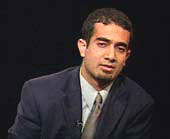 GERTZ:
GERTZ:The United States has dropped most of its Middle East agenda amid the focus by President Barack Obama on Israel and the Palestinians.A leading U.S. analyst said the Obama administration has shelved other concerns to concentrate on resolving the Israeli-Palestinian conflict.
The analyst said this has resulted in the suspension of the U.S. effort to promote democracy in the Arab world.
"The Obama administration is busy pushing the peace process ahead," Shadi Hamid, deputy director of the Brookings Institute in Qatar, said. "He wants support from the Arab regimes to find a solution to the Israeli -Palestinian conflict. So he is not talking about promoting human rights and democracy in the region."

Shadi Hamid, deputy director of the Brookings Institute in Qatar. AFP/Sabah Arar
In a Nov. 24 briefing, Hamid, whose family is Egyptian, said the Obama administration, like many in the West, believes that the resolution of the Israeli-Palestinian conflict would solve all of the problems in the Arab world. Hamid, however, said Arab-Israeli peace would not eliminate the dictatorships in the Middle East.
"Many believe that all the problems in the Arab world will be resolved once there is a solution to the Israeli-Palestinian conflict," Hamid said in the briefing in the Qatari capital of Doha. "I don't agree with this view. Dictatorial regimes will still be in power in the region and the fundamental issues will remain unresolved."
Hamid's assessment of U.S. priorities was voiced as the White House came under criticism from opposition groups in the Middle East. The groups have asserted that the administration was ignoring human rights violations in Iran as well as in such U.S. allies as Egypt, Libya Morocco and Tunisia.
"George Bush had given democracy a bad name, but it does not mean that democracy is a bad idea," Hamid said.
Hamid said the United States must be prepared to accept the emergence of Islamist governments in the Middle East. He cited the elected Islamist governments in Iraq and Turkey, which continue to cooperate with Washington.
"Islamist groups like the Muslim Brotherhood will play an important role in the political process in the region," Hamid said. "The Arabs have accepted this fact and the United States will also have to change its view sooner or later."
